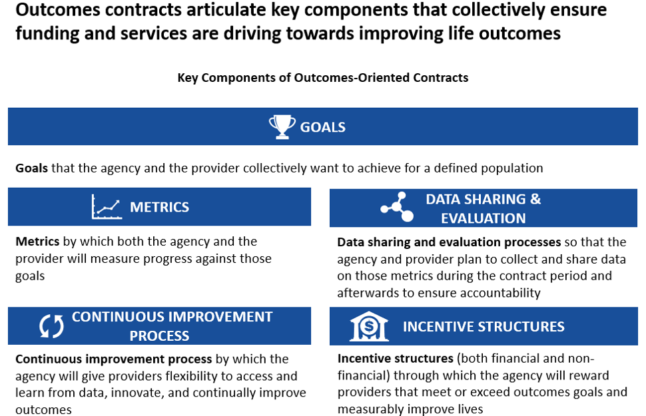Empowering Young Parent-led Families in Massachusetts to Achieve Economic Mobility
The data in front of us was sobering: 45% of adults, who received economic assistance under the Massachusetts Transitional Aid to Families with Dependent Children (TAFDC) program in January 2018, had grown up in families that also depended on TAFDC. “We have to do something different to break the cycle of intergenerational poverty,” Commissioner Jeff McCue of the Massachusetts Department of Transitional Assistance (DTA) implored.
As a member of the Empowering Families learning community, DTA, in collaboration with the Executive Office of Education, the Executive Office of Technology Services and Security, and the Governor’s Strategic Innovation Department, is working to improve its 2Gen approaches through the use of outcomes-oriented contracts and integrated data systems. DTA recognizes that social service funders must consider the role of the whole family in order to solve for social challenges that impact multiple generations. As such, DTA asked Third Sector to focus a portion of Empowering Families technical assistance on the reprocurement of the agency’s Young Parents Program (YPP).
YPP delivers education and employment related programming for pregnant or parenting young adults, ages 14-24, who receive TAFDC, and many of whom do not have a high school diploma. Funded by DTA, YPP is implemented by local nonprofit providers connected to DTA’s local Transitional Assistance Offices throughout the state. DTA’s previous procurement of YPP in 2008 contained forward thinking incentive structures, such as contingent payments tied to the achievement of outcomes. Still, as demonstrated by Commissioner McCue’s remark, YPP was not generating the desired impact, largely due to the lack of reinforcing mechanisms that allow for real time program adaptations and validation of outcomes achievement.
The reprocurement of YPP served as an opportunity to not only elevate DTA’s internal capacity and knowledge around outcomes orientation, but also directly apply the agency’s learnings into concrete changes to YPP Request for Response (RFR). Over the course of a month, Third Sector led two intensive workshops with DTA staff and agency partners and provided iterative review of YPP RFR drafts. The workshops leveraged a mix of case studies and group exercises to examine and enhance the revised YPP RFR across the five components of outcomes-oriented contracting:

- Goals
- Metrics
- Data sharing and evaluation
- Continuous improvement process
- Incentive structures
Third Sector and DTA sought to accomplish two key goals in this engagement together: 1) to refine the RFR before its scheduled release, and 2) to shape the future processes that would be built to support the increased use of 2Gen data in actively managing YPP contracts and fostering continuous collaborative program improvement with providers.
As a result of the workshops, DTA articulated 2Gen goals for the children, parents, and families who participate in YPP and refined the outcomes metrics used to measure success against those 2Gen goals. Two important aspects of refining YPP’s outcomes metrics included aligning metrics with those used by the Executive Office of Education in order to provide cross-agency consistency and adding outcomes to reflect progress for harder-to-serve populations in order to prevent provider creaming. In the workshops, DTA also identified administrative data sources that could measure outcomes achievement without creating additional reporting burden for providers and discussed forums for which data could be shared back to providers and examined at a regional level in order to promote provider sharing of best practices and inform continuous program improvement.
After a month of workshopping and rapid refinement, the Young Parents Program RFR was released on February 16, 2018. Third Sector and DTA are eager to see how this increased 2Gen focus and use of data at both the agency and provider-level will empower young parent-led families to achieve economic mobility and decrease their long-term need for TAFDC benefits.
The Empowering Families initiative is funded through a 2016 grant from the Social Innovation Fund.
